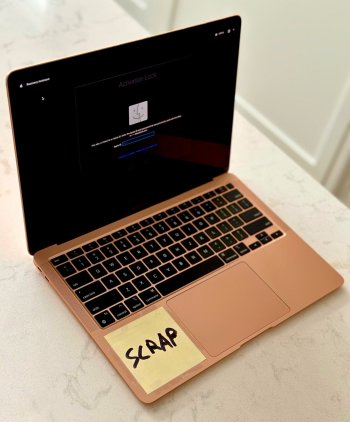Recently i have starting looking into a potential issue about Apple's software design. I'm talking about iCloud's activation lock and how it affects Tons of usable machines!
A refurbisher (@RDKLInc on twitter) has been sharing stories of numerous locked T2 enabled Intel Macs, and now even M1 MacBooks. These more than usable computers are turned into bricks, that are only good for parts. The reason is that they are activation locked, despite not being stolen. Large companies, schools, universities and other often buy iPads, iPhones or Macs in bulk, register them to their company account and use them for a given period of time. That's normal, but when these devices are replaced eventually nobody bothers to erase the iCloud account out of them. They are being sold to recyclers, which can't do anything about that and end up scrapping the device, a recent example i saw of this premature death is a MacBook Air M1, which is activation locked, and get this it has only 4 cycles on the battery. Essentially a brand new computer.
I find it really sad that many devices which can be used suffer this premature death. Imagine all the waste that is created every year. For a company that always wants to appear Green and caring about the environment, I find it really hypocritical!
I'm not talking about stolen devices, I fully understand that a stolen MacBook or iPhone should be Locked unless returned to their rightful owner. This issue regards big companies, who are too lazy to bother removing their account. Apple is a position where they are not directly in fault, but surely they know about this and choose to ignore it. A decision which is not in line with their green policies.
What do you think about this? Is there a way in which Activation lock can be changed to still keep stolen devices locked but not poorly managed devices?
Link to the tweet i am taling about:
(the picture is from there)
A refurbisher (@RDKLInc on twitter) has been sharing stories of numerous locked T2 enabled Intel Macs, and now even M1 MacBooks. These more than usable computers are turned into bricks, that are only good for parts. The reason is that they are activation locked, despite not being stolen. Large companies, schools, universities and other often buy iPads, iPhones or Macs in bulk, register them to their company account and use them for a given period of time. That's normal, but when these devices are replaced eventually nobody bothers to erase the iCloud account out of them. They are being sold to recyclers, which can't do anything about that and end up scrapping the device, a recent example i saw of this premature death is a MacBook Air M1, which is activation locked, and get this it has only 4 cycles on the battery. Essentially a brand new computer.
I find it really sad that many devices which can be used suffer this premature death. Imagine all the waste that is created every year. For a company that always wants to appear Green and caring about the environment, I find it really hypocritical!
I'm not talking about stolen devices, I fully understand that a stolen MacBook or iPhone should be Locked unless returned to their rightful owner. This issue regards big companies, who are too lazy to bother removing their account. Apple is a position where they are not directly in fault, but surely they know about this and choose to ignore it. A decision which is not in line with their green policies.
What do you think about this? Is there a way in which Activation lock can be changed to still keep stolen devices locked but not poorly managed devices?
Link to the tweet i am taling about:
(the picture is from there)


